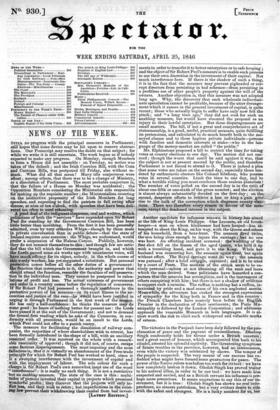NEWS OF THE WEEK.
A good deal of the indignant eloquence, oral and written, which politicians of both the " services " have expended upon Sir Robert Peel for standing by the Government Coercion Bill, has been little better than mouthing. From the first it has been generally admitted, even by very orthodox Whigs—though by them more in private conversation than in public debate—that the state of Ireland requires some coercion: the Whigs, we understand, would prefer a suspension of the Habeas Corpus. Publicly, however, they do not commit themselves to this ; and though few are satis- fied that the bill which the Government brought in, and which the Lords passed some six weeks ago with unanimous voice, will have much efficacy for its object, nobody, in the whole course of this wordy warfare has yet suggested a substitute. But personal protection comes before all the other duties of a government : the function that corresponds to it, the authority and power that should attend the function, resemble the faculties of self-preserva- tion in the individual man. 11-0y- eannpt be postponed to calcu- lations of profit and loss. The actual existence of government and order in a country comes before the regulation of commerce. If Sir Robert Peel had possessed a thorough ',confidence in the protective powers of his measure—in • its exact 'fitness to the ne- cessities and justice of the case—A .libuld have been justified in urging it through Parliament in the first week of the sesAlion. He has only a half-confidence : he thinks the measure may do some good : he hears of 'nothing better for present use : the Lords have passed it at the suit of the Government ; and not to demand the formal first reading which he asks of the Commons, in con- formity with all precedent, would be an insult to the Lords, which Peel could not offer to a parish vestry.
The measure for facilitating the dissolution of railway cora-
panies, the majorities of whose shareholders wish to retreat, has been formally introduced In the shape of a bill, with an ancillary sessional order. It was received on the whole with a remark- able unanimity of approval ; though it did not, of course, escape some factious .disparagements. The most imposing and the most fallacious is, that it is virtually an abandonment of the Free-trade printiPle. for which Sir Robert Peel has worked so hard, since it is a sweeping interference with the investment of capital and with the employment of labour. The sole colour for such a charge is Sir Robert Peel's own somewhat inept use of the word " interference" : it is really no such thing. It is not a restrictive but an enabling measure. The state of the case is this : multi- tudes of persons invested their capital in projects which promised wonderful profits ; they discover that the projects will only in- flict loss, and they wish to retire ; but imperfections in the exist- ing law prevent their withdrawing their capital from bad invest- ments in order to transfer it to better enterprises or to safe keeping ; and the object of Sir Robert Peel's measure is to enable such persons to use their own discretion in the investment of their capital. Not much interference here. If there is the shadow of such a thing, it is in the fact that the measure may prevent pigheaded or cor- rupt directors from persisting in bad schemes—from persisting in a profitless use of other people's property against the will of the owners. Another objection is, that this measure was not adopted long ago. Why, the discovery that such wholesale indiscrimi- nate speculation cannot be profitable, because of the utter derange- ment which it causes in the general investment of capital, is quite recent; those who actually begin to suffer have only now felt the pinch ; and "a long time ago," they did not wish for such an enabling measure, but would have resented the proposal as an injury to their lawful enterprise. But these disparagements arc small matters. The bill, if not a great and comprehensive act of statesmanship, is a good, useful, practical measure' quite fulfilling its pretensions, and calculated to do much benefit both to the mo- neyed classes and to those hapless private individuals—persona with families and domestic interests at stake—who in the lan- guage of the money-market are called "the public."
Mr. Elphinstone proposed a bill to restrict the time for taking votes at county elections to one day. The motion did not suc- ceed; though the worst that could be said against it was, that the subject is not at present mooted by the public, and therefore Parliament is not forced to attend to it. There is indeed a plea that some votes are taken on the second day, especially those ten- dered by enthusiastic electors like Colonel Sibthorp, who possess votes in several counties. Limit the time to one day, and to what a terrible riding you must condemn those zealous pluralists! The number of votes polled on the second day is in the ratio of about one-fifth or one-sixth of the gross number; and the election
is almost always substantially decided on the first day ; on te thx...." second, desperate efforts to retrieve a loss or keep a gain giv rise to the bulk of the corruption which disgraces county elec- tions. There was therefore every reason in favour of the mea- sure, except the deadened interest in the subject. ti


























